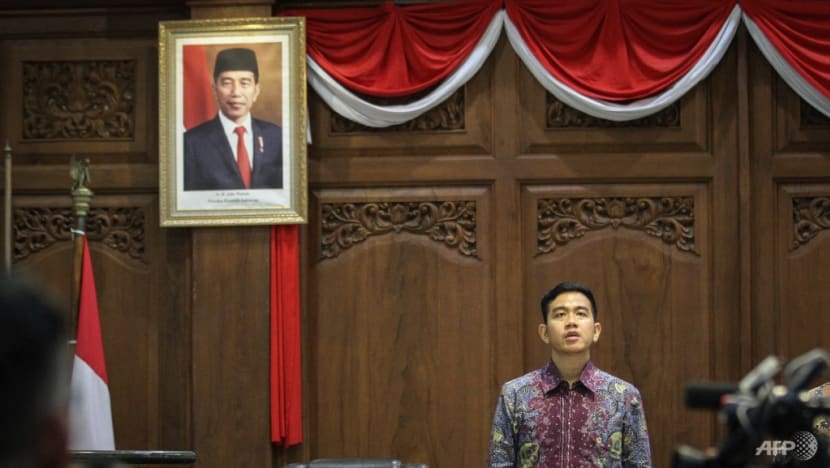Commentary: Politics is a family business in Indonesia - again
Indonesian President Joko Widodo's son has been nominated as a vice-presidential candidate for next year's election. It's a worrying sign for the country's democratic transition, says Karishma Vaswani for Bloomberg Opinion.

File photo of Gibran Rakabuming Raka, the son of Indonesian President Joko Widodo, at a public hearing with members of the regional House of Representatives in Solo, central Java, on Oct 19, 2023. (Photo: AFP/Dika)

This audio is generated by an AI tool.
SINGAPORE: Indonesia’s President Joko Widodo is expanding his family dynasty, son by son. The announcement that his eldest child Gibran Rakabuming Raka has been picked as Defence Minister Prabowo Subianto’s running mate in next year's presidential election is just the latest in a series of political manoeuvres that have cemented his image as a Javanese kingmaker. It will also allow him to pull the strings behind the scenes long after he relinquishes power.
This is deeply disappointing for the nation’s nascent democracy, the world’s third largest, and many Indonesians had hoped it wouldn’t happen. Mr Subianto will register his candidacy on Wednesday (Oct 25).
To understand what a huge departure this is from the man he used to be, it’s worth reflecting on how much Jokowi, as he is known, has changed during the course of his presidency.
I first met him more than a decade ago, when he was governor of Jakarta. At the time, chatting to him in a leafy green park in his white crisp linen shirt and sandals, I was struck by his sincerity and disruptor mentality. As an outsider, he could see the obvious issues that needed to be fixed within the political establishment and there appeared to be a genuine desire on his part to change things.
But that optimism and enthusiasm were pushed aside for the practicalities of doing politics in Indonesia. This included the weakening of the anti-corruption agency, and a drift toward authoritarian politics. Millions of people elected him as the leader of the world’s most populous Muslim nation in 2014, believing he would be different from the cast of characters in the Suharto era.
Jokowi’s victory was rightly heralded as a milestone, a coming of age for the country’s democracy - a sign that if a furniture maker from Solo could beat the odds, as one voter told me at the time, any outsider could do the same.
PRACTICALITIES OF DOING POLITICS IN INDONESIA
How things have changed. If you want to do well in politics in Indonesia, it certainly helps to be related to Jokowi.
Take a look at the family tree. Not only is 36-year-old Mr Raka campaigning for the vice-presidential spot, in 2020 he was elected mayor of his home city of Solo. The young politician won by a landslide in large part thanks to Jokowi’s popularity and social capital.
Then there’s the younger son, 28-year-old Kaesang Pangarep, better known for his YouTuber appeal than his political experience, who last month became chief of the Indonesia Solidarity Party (PSI), catering to younger voters.
And finally, son-in-law Bobby Nasution, voted in as mayor of Medan in 2020. His campaign drew heavily on family connections, building a perception that he would get special attention from the central government because of his privileged position.
Jokowi has batted away any suggestion that his family benefits because he is the head of state. If Indonesians want to vote them in, he told me in an interview in 2020, I can’t stop them. It is the public’s decision.
But even the charismatic leader, with his consistently solid approval ratings, won’t be immune to the public’s displeasure with what appears to be dynastic politics re-emerging in the archipelago.
“A vote for Gibran as vice-president will ensure that Jokowi will be able to continue having behind-the-scenes influence during the Prabowo administration,” Alexander Arifianto, senior fellow at the Institute for Defence and Strategic Studies in Singapore told me. “Political dynasties in Indonesia are not unusual, but not particularly effective. They also invite public backlash once declared openly.”
THE PEOPLE HAVE SEEN THIS MOVIE BEFORE
That backlash is already beginning. Last week’s ruling by the constitutional court to lower the minimum age for presidential and vice-presidential candidates with legislative or regional leadership experience, was widely viewed as a way to clear legal obstacles for Mr Raka’s vice-presidential bid. The response has been largely negative, partly due to the fact that presiding over the proceedings was Chief Justice Anwar Usman - the Indonesian leader’s brother-in-law.
The transformation of Jokowi the man of the people, to Jokowi the pragmatic politician and now potential dynasty builder has been slow and gradual. Like many other Asian leaders, his priority has been economic development and infrastructure reform rather than a focus on fixing democratic institutions, often at the expense of weakening them. If his economic ambitions collided with anti-corruption agendas, he prioritised the former, notes Burhanuddin Muhtadi, of Syarif Hidayatullah State Islamic University in Jakarta.
Zeroing in on development is straight out of dictator and former president Suharto’s playbook. A fellow Javanese, he ruled Indonesia for over three decades and died in 2008. He left behind six children who, at one point, were among the wealthiest people in the country, with extensive business interests granted by their father when he was in power.
Now it is Suharto’s former son-in-law, Mr Subianto, who is tying up with Jokowi’s son to lead the country next year. None of this will be lost on Indonesians. They’ve seen this movie before and will be wondering whether keeping it all in the family is what’s best for their future.
















